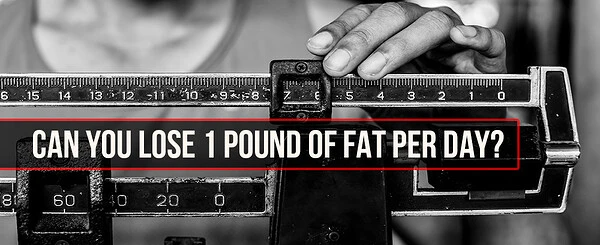Title: Can One Lose 1 Pound of Fat Per Day?
Author: Chris Shugart
Abstract: This article explores the possibility of losing one pound of fat per day without sacrificing muscle. It delves into an extreme study and contrasts it with a more rational approach to fat loss.
I. Introduction
The question at hand is whether it is feasible to shed a pound of fat daily while preserving muscle mass. The answer is affirmative, yet the proposed plan is rather extreme.
II. Conventional Fat - Loss Method
The most effective way to lose fat typically involves reducing one's maintenance calorie intake by approximately 300 - 500 calories. Additionally, consuming about one gram of protein per pound of body weight and engaging in weightlifting is recommended. This approach is consistently effective, has a low likelihood of fat regain, and is relatively manageable.
III. Extreme Fat - Loss Study
Study Objectives and Participants
Researchers aimed to investigate the effects of extreme dieting and exercise on the human body. They recruited 15 overweight men, around 40 years old, with waist circumferences of 40 inches or more.
Dietary Regime
For four days, the participants were restricted to a mere 320 - calorie - per - day diet. Some received these calories from whey protein, while others from a sucrose (table - sugar) drink. This meager intake was divided into three unfulfilling "meals."
Exercise Regime
Each day, the subjects first performed 45 minutes of hand - cranking exercise, followed by an 8 - hour treadmill walk, covering a distance of 22 miles per day.
IV. Study Outcomes
Weight Loss
On average, the subjects lost 11 pounds of total body weight over the four - day period.
Approximately 5 pounds of this weight loss was fat, indicating a loss of about one pound of fat per day.
The remaining weight loss was water. This is a common occurrence in diet plans, as the body initially sheds water weight (since muscle contains around 73% water and fat around 13% water). However, the body stabilizes soon after.
Muscle Preservation
Surprisingly, no muscle loss was observed within the four - day period. Although the researchers reported that participants lost more "lean mass" than body fat, the lean mass measurement included body water. Using DEXA and bioelectrical impedance, the researchers accurately measured water weight and determined that muscle was preserved.
Diet Composition Impact
Whether the 320 calories were derived from whey protein or sugar had no significant impact on the results. This is likely because it is difficult to lose actual muscle in just four days, even with such an extreme plan.
Long - Term Fat Loss
Fat loss was maintained for at least a year after the four - day diet/exercise plan. There was no "fat overshoot," meaning the subjects did not regain all the fat lost during the diet. Although their body weight increased due to natural water - weight stabilization, they kept most of the fat off.
V. Lessons Learned
Feasibility of Extreme Fat Loss
It is possible to lose one pound of pure fat per day, but this requires an extreme and nearly unfeasible approach, at least in a laboratory setting.
Muscle Preservation in Overweight/Obese Individuals
Overweight or obese individuals can lose fat and retain muscle in the short term, even with an unconventional diet and exercise plan. The subjects in the study managed to avoid fat rebound, despite being allowed to eat and exercise as they pleased after the study.
Differential Muscle Loss in Lean vs. Overweight Dieters
Lean individuals attempting to get extremely shredded through dieting are more likely to lose muscle compared to overweight dieters. Thus, this extreme "plan" is unrealistic and not recommended for real - life use.
Importance of Protein Intake
A high protein intake during long - term dieting undoubtedly leads to better muscle retention. Also, a diet based solely on table sugar is not advisable.
VI. A More Rational Approach
Appeal and Drawbacks of Rapid Fat - Loss Plans
Rapid fat - loss plans are attractive due to their simplicity, such as consuming a 106 - calorie drink three times a day and walking extensively. However, this is unhealthy in the long run, as demonstrated by the four - day duration of the above - mentioned study.
Recommended Approach
Instead, aiming for a fat loss of about one pound per week using a muscle - preserving plan is more advisable. For those who prefer a simple liquid - only meal approach, The One Day Diet Plan can be considered. It involves having one very low - calorie day per week using MD Protein and six maintenance days of regular eating, with an additional 17 minutes of walking each day.
VII. Acknowledgment
Thanks to T Nation contributor Bill Campbell, Ph.D., for highlighting this unusual study in his Body by Science newsletter.
VIII. Reference
Calbert et al. "A time - efficient reduction of fat mass in 4 days with exercise and caloric restriction," Scand J Med Sci Sports, 2015 Apr;25(2):223 - 33. doi: 10.1111/sms.12194. Epub 2014 Mar 6.
The Almost Impossible Diet
•
Author: Gareth Sapstead
•
fitness
sport
life

Share this article
